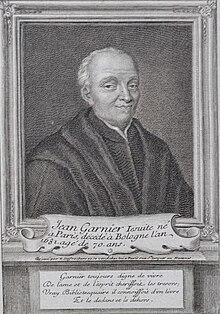Jean Garnier (church historian)
Jean Garnier (born November 11, 1612 in Paris , † November 26, 1681 in Bologna ) was a French Jesuit , patristic , church historian and moral theologian.
Life
Garnier was born in Paris. He entered the Society of Jesus at the age of 16 . After completing his studies, he taught intellectual history and later philosophy in Clermont-Ferrand from 1643 to 1653 and theology in Bourges from 1653 to 1681 . In 1681 he was sent to Rome to deal with the affairs of the Order, fell ill on the way and died in Bologna.
Garnier was regarded as one of the most important scholars among the Jesuits of his time. He was an excellent expert on the written sources and the history of early Christianity.
Works
In 1673 he published the Libellus fidei ad Libellus fidei ad Innocentium of Pelagius , a work that Pelagius had sent to the Holy See in the course of a theological debate on Augustine's attitude to Manichaeism . Garnier appended notes and a comment to the scripture.
In 1655 he published his Regulae fidei catholicae de gratia Dei per Jesum Christum in Bourges . In 1673 he published a complete edition of the works of the heresiologist Marius Mercator († in Constantinople after 451) in Paris . The edition consists of two parts, the first of which contains the writings of Mercator against Pelagius, including the Libellus fidei and comments on the texts:
- "De primis auctoribus et praecipuis defensoribus haeresis quae a Pelagio nomen accepit"
- "De synodis habitis in causa Pelagianorum"
- "De constitutionibus imperatorum in eadem causa 418-430"
- "De subscriptione in causa Pelagianorum"
- "De libellis fidei scriptis ab auctoribus et praecipuis defensoribus haeresis Pelagianae"
- "De iis quae scripta sunt a defensoribus fidei catholicae adversus haeresim Pelagianorum ante obitum S. Augustini"
- "De ortu et incrementis haeresis Pelagianae seu potius Caelestianae".
In the second part, Garnier gives an overview of the history of Nestorianism from 428 to 433, of Mercator's writings on this heresy : This is followed by two treatises on the heretical teachings and writings of Nestorius and on the Synod from 429 to 433 on this subject. Garnier's edition was subsequently valued by experts for its outstanding historical knowledge, but also criticized for the partiality of its investigations. In 1675 Garnier published the Breviarum causae Nestorianorum in Paris , a compilation compiled before 566 by Liberatus , an archdeacon of Carthage. He corrected errors in the manuscript, added notes and a treatise on the Fifth Ecumenical Council of Churches . In 1678 he published the Systema bibliothecae collegii Parisiensis SJ , a kind of reference book for librarianship.
In 1680 the Liber diurnus Romanorum Pontificum was published on the basis of an ancient manuscript to which he added three essays, namely:
- De indiculo scribendae epistolae
- De ordinatione summi pontificis
- De usu pallii .
In De Ordination he handled the case of Pope Honorius , who 40 years after his death from the Council of Constantinople Opel with the excommunication had been occupied, and the thought was innocent.
In 1642 Garnier's friar, the Jesuit Jacques Sirmond, published a four-volume edition of the works of Theodoret , Bishop of Kyrrhos († 455). Garnier added an "Auctarium" to the edition, which was not published until 1684. The "Auctarium" consists of five chapters:
- "De ejus vita";
- "De libris Theodoreti";
- "De fide Theodoreti";
- "De quinta synodo generali";
- "De Theodoreti et orientalium causa".
In these essays he goes to court with Theodoret severely and condemns him.
Garnier's treatise Tractatus de officiis confessarii erga singula poenitentium genera was published posthumously in Paris in 1689.
literature
- Friedrich Wilhelm Bautz : Garnier, Jean. In: Biographisch-Bibliographisches Kirchenlexikon (BBKL). Volume 2, Bautz, Hamm 1990, ISBN 3-88309-032-8 , Sp. 178.
| personal data | |
|---|---|
| SURNAME | Garnier, Jean |
| ALTERNATIVE NAMES | Garnerius, Joannes; Garnerius, Ioannes; Garnerius, Johannes; Garnierus, Johannes; JGPSJ |
| BRIEF DESCRIPTION | French Jesuit |
| DATE OF BIRTH | November 11, 1612 |
| PLACE OF BIRTH | Paris |
| DATE OF DEATH | November 26, 1681 |
| Place of death | Bologna |
